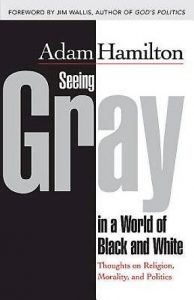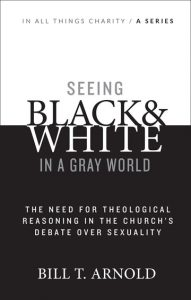 By Walter Fenton-
By Walter Fenton-
In his recent respectful, but critical appraisal of so-called United Methodist “centrism,” Dr. Kevin Watson, Assistant Professor of Wesleyan and Methodist Studies at Candler School of Theology, says he has “no idea to what extent [the Rev. Adam] Hamilton desires to be seen as a leader of… the United Methodist Centrist Movement.”
Question asked, question answered. Hamilton has quickly responded with an essay of his own entitled “In Support of United Methodist Centrists.”
Watson’s critique and Hamilton’s response are well worth reading, particularly with the launch of a new caucus group called “Uniting Methodists” (Hamilton has openly identified with it).
But here, we want to consider whether self-identified “centrists” are actually at the center of the worldwide United Methodist Church.
For Hamilton, a centrist is a compassionate, faithful United Methodist who recognizes that other compassionate, faithful United Methodists “disagree on how to interpret the Scriptures cited as relevant to the questions of same-sex marriage.”
The centrist caucus appears to promote a new UM infrastructure where some pastors preside at same-sex weddings and where some annual conferences ordain openly gay clergy, and, at the same time, some pastors only miles away decline to preside at same-sex weddings and some annual conferences refuse to ordain openly gay clergy.
Presumably, the centrist caucus would also promote legislation where some annual conferences could discipline a pastor who declined to receive an openly gay person as a church member, and, at the same time, would defend a pastor’s right to decline administering the membership vows in a different annual conference.
For a moment we will set aside this rather novel approach to a Christian church’s sexual ethics, teachings on marriage, ordination standards,  and even its membership vows to consider how Hamilton arrives at his definition of a centrist. For him, if two Christ loving, warm hearted, passionate United Methodists reach different conclusions regarding a given ethical issue, it most likely means the issue in question requires us to see gray even if what we want is a clear cut answer (see his book Seeing Gray in a World of Black and White and also Dr. Bill Arnold’s Seeing Black and White in a Gray World). This philosophy comes to the conclusion that the ethical issue is gray. In response, the best approach appears to be to sit loosely on the matter, allowing plenty of room for faithful people who have legitimate differences.
and even its membership vows to consider how Hamilton arrives at his definition of a centrist. For him, if two Christ loving, warm hearted, passionate United Methodists reach different conclusions regarding a given ethical issue, it most likely means the issue in question requires us to see gray even if what we want is a clear cut answer (see his book Seeing Gray in a World of Black and White and also Dr. Bill Arnold’s Seeing Black and White in a Gray World). This philosophy comes to the conclusion that the ethical issue is gray. In response, the best approach appears to be to sit loosely on the matter, allowing plenty of room for faithful people who have legitimate differences.
This is often a fair-minded, generous, and practical approach to some thorny ethical issues, and the church has decided to handle some of them in just this fashion. However, as Hamilton himself acknowledges, there are some ethical issues that cannot be handled this way. And that is the crux of the matter when it comes to the church’s sexual ethics, teachings on marriage, and its ordination standards.
Both LGBTQ advocates and the UM Church (through the General Conference) do not think we can sit loosely on these matters. The former believe justice is at stake and therefore there is no room for compromise. They are so fervent in their convictions that they have defied the church of which they are members.
 The UM Church believes its standards are firmly rooted in Christian teaching and are reflective of what the church universal has taught at all times and in all places. With compassion and grace, it calls on Christ followers to do the hard work of warmly and compassionately engaging with people who feel – often justifiably – marginalized and mistreated. However, it maintains it cannot yield on an issue that has paramount ramifications for the community of faith, for some of its core theological and ethical convictions, and for families and society in general. As challenging as it can be, the church believes it must speak the truth with grace and charity. And it believes this is done most effectively at the most basic level, where pastors and lay people open their doors, befriend others, listen, and speak kindly and warmly at the right time.
The UM Church believes its standards are firmly rooted in Christian teaching and are reflective of what the church universal has taught at all times and in all places. With compassion and grace, it calls on Christ followers to do the hard work of warmly and compassionately engaging with people who feel – often justifiably – marginalized and mistreated. However, it maintains it cannot yield on an issue that has paramount ramifications for the community of faith, for some of its core theological and ethical convictions, and for families and society in general. As challenging as it can be, the church believes it must speak the truth with grace and charity. And it believes this is done most effectively at the most basic level, where pastors and lay people open their doors, befriend others, listen, and speak kindly and warmly at the right time.
Judging from the declarations on the new centrist website, it seems as if it is advocating that the theological and ethical issues surrounding same-sex marriage, ordination, and church membership are not of paramount importance and that global United Methodism can move forward where some pastors joyfully preside at same-sex weddings, and others are firmly convinced such weddings are contrary to Christian teaching. This version of centrism appears to neither warmly promote the church’s teachings, nor will it wholeheartedly advocate for the full and unfettered inclusion of LGBTQ people. While no one would question the sincerity of their beliefs, the centrist caucus errs in believing that this puts them at anything approximating the center of the church. It does not; it puts it at odds with the church.
Wittingly or unwittingly, the centrist caucus is attempting to usurp the center of the church from the duly elected delegates who are sent to represent United Methodists at its General Conferences. This global body – representing people from Africa, Europe, The Philippines, and the U.S. – either reaffirms or modifies our Book of Discipline, and it alone constitutes the actual center of the church. Those who want the church to adopt a novel, laissez faire approach to its sexual ethics, its teachings on marriage, and its ordination standards may well be sincere, good-hearted people, but it’s a stretch to call this centrism.
To be fair, the new centrist caucus – complete with high-profile clergy as well as the past and present top executive from the United Methodist Publishing House – are not completely indifferent to the teachings of the church or the demands of LGBTQ advocates, but they are apparently willing to champion an exotic approach that is almost certainly a recipe for disaster.
For example, the centrist caucus would have us believe the UM Church could function as a healthy and vibrant denomination where two ministers, in the same community, teach diametrically opposite things about marriage and sexual intimacy. One teaches same-sex marriage is morally unacceptable, while another maintains LGBTQ marriages are to be celebrated. One teaches sexual intimacy is meant to be monogamous, heterosexual, and expressed in the confines of a marriage; the other warmly approves of LGBTQ understandings of sexual intimacy and marriage. This is not a credible way forward.
Practically speaking, particularly for bishops and district superintendents who have to appoint pastors to local churches, it’s a train wreck in the making. But even more importantly, their exotic plan of accommodation will solve little or nothing.
Previous versions of this “local option” plan were met with contempt by some ardent LGBTQ advocates. It was seen as an unacceptable vision of “gradualism” or “accommodationalism” – institutional leaders willing to sell them out whenever this or that annual conference has the votes to deny them full inclusion.
To those who find themselves in the center of the global United Methodist Church – those who actually support the church’s teachings, abide by its polity, and respect the will of the General Conference – the centrist caucus looks like it is willing to perpetuate an on-going division because they continue to see only gray.
Both sides – LGBTQ advocates and the UM Church – want the centrist caucus to take a stand on an issue where the church cannot have it both ways. Do they support LGBTQ advocates’ cry for full inclusion? Or do they stand with the center of The United Methodist Church, which believes what Christians at all times and in all places have taught regarding our sexual ethics and teachings on marriage.
Seeing only gray is no longer a luxury LGBTQ advocates or the UM Church can afford.
Walter Fenton is a United Methodist clergyperson and an analyst at Good News.






There are few concepts more abhorrent than a denominational split; however, any denomination that chooses to reinterpret scripture as a paean to 21st century cultural sensibilities is choosing a divided future. We should not desire unity; rather, we should desire that ALL in the UMC have the mind of Christ. If this were the case, labels such as traditionalist, progressive or centrist would have no place; we would only bear the label Christian.
After reading Agam Hamilton’s response (below), I agree even more with Walter Fenton’s, “At the Center of What?”. I have read some of Adam Hamilton’s books, and he has a propensity of using sound-good language to arrive at a murky, sometimes incoherent conclusions. This is another example of that.
The one crucial and defining fact that progressives/centrists continue to demonstrate is that they have yet been able to point to specific Scripture that in any way supports same-sex marriage or the practice of homosexuality, unless, of course, one follows Rev. Hamilton’s formula of discarding what the Bible actually says about these matters.
http://www.adamhamilton.org/blog/a-response-to-kevin-watsons-struggle-with-centrism#.Wb_pmtEpChB
The idea that a denominational split is abhorrent is derived from the unity of believers that we find primarily in John 17 and Ephesians 4. I would posit that we tend to misinterpret those passages to mean that we need to force unity within the visible church. Instead, I believe, they are really saying that the Holy Spirit creates unity within the body of Christ which we should nurture. This is a fundamentally different understanding which rejects the idea that visible unity between Christian and non-Christians within a visible, organized denomination is a good thing when it comes at the expense of purity and Christian witness to a hurting and dying world. In other words, I basically agree.
All of the confusion about whether or not homosexuality is sin Is further evidence that the Methodist church does not have much of an apostolic line.
Rev. Hamilton has over the years gone further and further away from sound biblical interpretation and more and more to a secular interpretation of scripture. Homosexuality is a sin along with adultery, theft and murder. You can simply pick and choose which scriptures in the moral code of the bible you wish to follow and which scriptures you wish to discard. There are no three buckets to put scripture into.
Very well put Jon!
No I think this type of Christology is more abhorrent than the church splitting:
Dr. Karen Oliveto ,
A Canaanite woman came down from the hills and pleaded with Jesus to heal her sick daughter. Jesus ignored her. The disciples get involved, “Jesus, can’t you do something? She’s driving us crazy.” Jesus tells them no.
Then the woman came back to Jesus, went to her knees, and begged. “Master, help me.” He said, “It’s not right to take bread out of children’s mouths and throw it to dogs.” She was quick: “You’re right, Master, but beggar dogs do get scraps from the master’s table.” Jesus gave in and the woman’s daughter is healed.
Jesus, Jesus, what is up with you? Where is the gentle Jesus, meek and mild, the one who said, “Let the children come to me”? What happened to Jesus, the one who said, “Consider the lilies”. Where did his compassion and love go?
But as I ponder the story, as I look at the verbal jousting between Jesus and this female who is considered less than human because of her gender and ethnicity, I can’t help but note how Jesus comes around.
Too many folks want to box Jesus in, carve him in stone, create an idol out of him. But this story cracks the pedestal we’ve put him on. The wonderful counselor, mighty God, everlasting one, prince of peace, was as human as you and me. Like you and me, he didn’t have his life figured out. He was still growing, maturing, putting the pieces together about who he was and what he was supposed to do. We might think of him as the Rock of Ages, but he was more like a hunk of clay, forming and reforming himself in relation to God.
As one person put it: “Jesus wasn’t a know-it-all, he was also learning God’s will like any human being and finally he changed his mind…if Jesus didn’t have to know it all innately, but rather could grow into new and deeper understanding through an openness to God’s people [even those he formerly discounted], maybe if Jesus could change his mind then maybe so can we!
As he encountered this one who was a stranger, he comes to a fuller sense of the people he is to be in relationship with. He is meant to be a boundary crosser, and in the crossing over, reveals bigotry and oppression for what they are: human constructs that keep all of us from being whole. He learns that no one, no one, including the outsider, the foreigner, the hated, the misunderstood, the feared, no one is outside of the heart of God and the care of God.
In his conversion, by changing his mind and acting outside of tradition, by treating the woman as a person and responding to her needs, Jesus is willing to stand against culture and social norms and risk his status and power. It is this action of giving up that Jesus gains the most: because of his willingness to be in relationship with one so different, Jesus finds greater intimacy with God. The two go hand in hand.
This is the heart of the story. This is what offers us hope. If Jesus can change, if he can give up his bigotries and prejudices, if he can realize that he had made his life too small, and if, in this realization, he grew closer to others and closer to God, than so can we.
All denominations are struggling with it. LGBT is now synonymous with idol inside Christianity. It would seem natural for the LGBT Movement to establish a new denomination that would attract members from the numerous denominations.
http://www.foxnews.com/us/2017/09/20/pro-gay-us-priest-hit-over-defense-lgbtq-catholics-in-latest-book.html
Agreed, that is a disgusting misinterpretation of the passage that shows a complete lack of understanding of the overall lens of the Bible as a whole. It is far more damaging for us to condone that kind of false teaching in our pulpits than for the denomination to split.